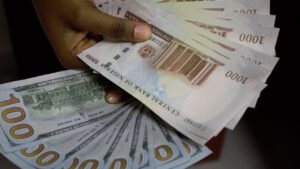Any sincere government who wishes to be pragmatic and realistic can easily measure its performance from how it has been able to directly or indirectly bring progress and prosperity to its people. If President Bola Ahmed Tinubu were to do an analysis of his last 100 days in office vis a vis the impact on the lives of Nigerians since May 2023 when he took over the reins of leadership, even him would aptly caption it as hell and fury, writes Adesuwa Tsan.
Tinubu rode to power on the back of an election that clearly divided Nigerians along ethnic and religious lines. By the time the 2023 presidential election was over, it was adjudged as one of the divisive that Nigeria has witnessed in recent times. The tensions from the toxic campaigns had yet to die down when the Nigerian people sat in front of television screens to watch the live transmission of his inauguration as the 4th Republic’s 5th President at the Eagle Square. Still reeling from the impact of the inefficient handling of the economy by the then outgoing President Muhammadu Buhari’s administration and hoping for better days ahead, they couldn’t have known that their lives were about to take a turn for the worse.

100 days of unexpected hardship
Within hours, the whole country began to feel the presence of the new administration. There was no waiting game. President Tinubu’s announcement, ‘’Fuel subsidy is gone forever,’’ sent majority of Nigerians straight into a deep economic hole that they are yet to climb out of. From day 1 in office, queues began to build up across fuel station in the country as Nigerians rushed to fill their car tanks in anticipation of a hike in the pump price. Even then, they couldn’t have assumed in their wildest imagination, the kind of hardship that laid ahead in the coming weeks and months.
Prices of essential commodities such as food and transportation rose as oil marketers hoarded fuel in order to sell at a higher price, causing scarcity of the product. Finally, the Nigeria National Petroleum Company Limited (NNPCL) released the new pump price of fuel, pegging it at between N567 to N617, depending on the location in Nigeria where it is being sold. Transportation fares increased by over 300 percent after the announcement and have remained there.

The announcement of the naira floatation followed, worsening the woes of the people. While the government, private sector and the International Monetary Fund/World Bank celebrated these policies, the average man on the street wondered for how long he could possibly continue to bear the weight of their implications.
Impact on Families, Education, Nutrition, Public Health
The policies were touted as pro-poor, but small businesses have been negatively impacted as lesser people have money to patronise their services. Others are struggling to keep up with rising operational costs and the need to increase wages of employees. Amidst this, school fees have skyrocketed, even in public institutions, people can hardly feed their families with the price of food climbing beyond their financial reach. The purchasing power of the money in their hands diminishes daily as the naira steadily loses value. Even the cost of drugs to treat common ailments such as malaria have increased by more than 200 percent. It’s been a hundred days of pain, agony and dashed hopes.

But what is more bewildering is the realisation, as the days and months go by, that the Tinubu administration did not have any plan on how to manage the impact of the policies on the common man before the implementation began.
Another 7.1 million people are set to be plunged into poverty due to mismanagement of the fuel subsidy removal, in addition to 4 million others who became poor in the first half of 2023. This is bad news for the development of the country. The Tinubu policies have caused inflation, currency devaluation and crippling businesses within its first 100 days, and his government is now pumping billions of naira into providing “palliatives” to the people using the same corrupt, wasteful, and inefficient state and federal bureaucracy that have never yielded any benefit to the Nigerian masses.
The state governors have been receiving N2 billion out of N5 billion each to provide palliatives, especially to buy rice and distribute to people in their respective states. In many cases reported, up to 5 people share a bag of 50KG rice and that is it.

Buses have been provided in some states, with some offering free services or subsidised fares but the number of buses and beneficiaries leave much to be desired. Moreover, this service will benefit the people in the urban areas, what happens to the rural dwellers, or is it just the one-off distribution of foodstuff that can barely last 3 days?
In a bid to provide succour for the people, some state governments have reduced the number of days for their workers to show up at work. No provision was made for remote work, meaning that the already low productivity in the public service will be further reduced. Another loss for Nigeria.
One benefit that can be easily noted from President Tinubu’s administration since he assumed office is the fact that the roads are freer of traffic congestion. Gone are the days when gridlocks used to frustrate commuters during rush hours because many people can no longer afford to fuel their cars and have parked them at home.
There have been promises, and Nigerians are cautiously hopeful that in the days ahead, the Federal Government will provide the kind of meaningful support needed to stabilise their livelihoods that have been destroyed or badly shaken by the policies of President Tinubu in the last 100 days in office. Now is not the time for belt tightening policies but providing soft landing for a people who have been through a lot in the last 8 years.



